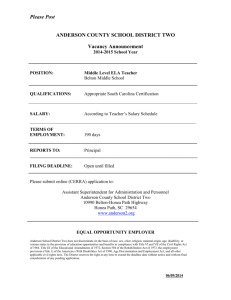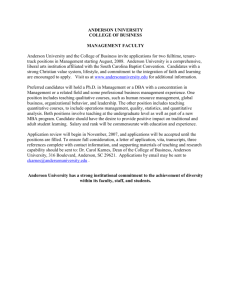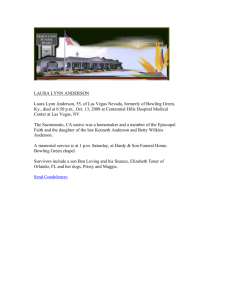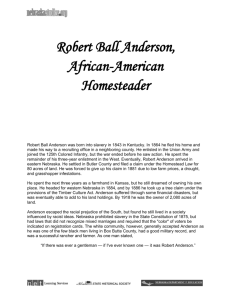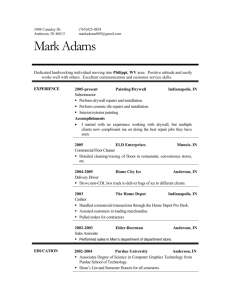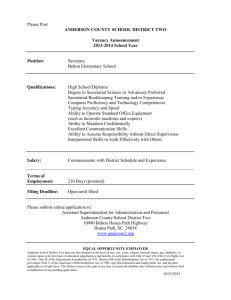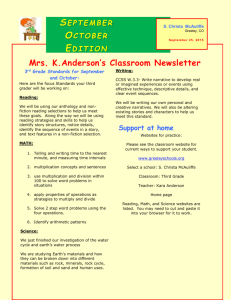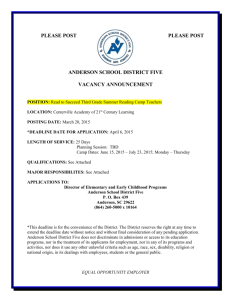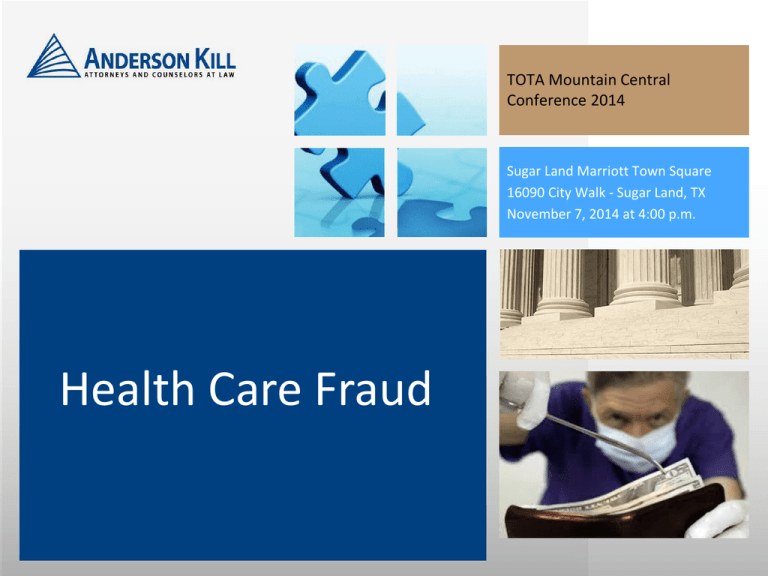
TOTA Mountain Central
Conference 2014
Sugar Land Marriott Town Square
16090 City Walk - Sugar Land, TX
November 7, 2014 at 4:00 p.m.
Health Care Fraud
Disclaimer
The views expressed by the participants in this program
are not those of the participants’ employers, their clients,
or any other organization. The opinions expressed do not
constitute legal advice, or risk management advice. The
views discussed are for educational purposes only, and
provided only for use during this session.
2
1039964v1 © 2014 Anderson Kill P.C. All Rights Reserved.
Your Speaker
Richard Y. Cheng, OTR, JD
Anderson Kill P.C.
ph. 972-728-8753
rcheng@andersonkill.com
3
1039964v1 © 2014 Anderson Kill P.C. All Rights Reserved.
Presentation Overview
Healthcare Fraud Statistics
Investigations
Potentially Problematic Conduct
Sanctions
Civil and Administrative Statutes
Criminal Statutes
Stark
Responding to Government Inquiries
Protective Measures
4
1039964v1 © 2014 Anderson Kill P.C. All Rights Reserved.
Annual Loss Due to Health
Care Fraud-FY 2013
Federal government won or negotiated $2.6 billion for
healthcare fraud.
Medicare Trust Fund received transfers of $2.85 billion, including
over $576 million in Medicaid.
Over $25.9 billion since program started in 1997.
5
1039964v1 © 2014 Anderson Kill P.C. All Rights Reserved.
2012 Federal Healthcare Statistics
1013 New Criminal Cases Opened (1910 Defendants)
2014 Open Criminal Investigations (3535 Defendants)
80 Cases Filed (843 Defendants)
718 Convicted
1083 Civil Investigations Opened
1079 Pending Civil Cases
3214 Exclusions (Individuals and Entities)
6
1039964v1 © 2014 Anderson Kill P.C. All Rights Reserved.
Investigations
Federal Government—CMS, OIG and DOJ
State Government—Texas Health and Human Commission OIG &
AG.
Private Insurers and intermediaries
Whistleblowers/Qui Tam –state and federal. Main reason for
FCA and Stark Law violations.
State Licensing Boards—may lead to referral to other state
agencies which could result in further investigations.
7
1039964v1 © 2014 Anderson Kill P.C. All Rights Reserved.
Most Common Conduct
Services not rendered—documentation and time provided.
Up-coding—non-existing upgrade procedure or beyond what is necessary
Unbundling—common in clinical laboratory settings
False medical necessity certification
Kickbacks/Improper relationships
Retention of overpayments
8
1039964v1 © 2014 Anderson Kill P.C. All Rights Reserved.
Inducements to Beneficiaries,
Referral Sources and Employees
Offers of gifts or gratuities to beneficiaries
Cost-sharing waivers and discounts
Free Transportation
Preventative care service
Gifts to referral sources
Payments Based on Production/Commissions
Co-pay waivers
9
1039964v1 © 2014 Anderson Kill P.C. All Rights Reserved.
Billing
Inadequate resolution of overpayments
Lack of integrity in computer systems
Software programs that encourage billing personnel to insert data in fields
suggesting services were rendered
Knowing misuse of provider ID numbers
Outpatient services with inpatient stay
Billing for discharge instead of transfer
Improper use of modifiers
Internal coding practices
Coding without supporting clinical documentation—”Assumption Coding”
Altering documentation
Billing for services provided by unqualified or unlicensed personnel
10
1039964v1 © 2014 Anderson Kill P.C. All Rights Reserved.
Quality of Care
Sufficient Staffing
Comprehensive Care Plan
Appropriate Medication
Safety
Services rendered
EXAMPLE: In Texas, the AG Medicaid Fraud Control Unit
investigates patient neglect and abuse if the provider is a Medicaid
provider and receiving Medicaid funds.
11
1039964v1 © 2014 Anderson Kill P.C. All Rights Reserved.
Home Health
Over utilization and under utilization regarding number of visits or length of home
health coverage
Knowingly billing for inadequate or substandard care
Billing for unallowable costs of home health coordination
Unqualified personnel
False dating of amendments
Falsified plans of care
Forged beneficiary signatures
Discriminatory admission and discharge
Knowing misuse of provider certification numbers
Duplication of services
Knowing or reckless disregard of willing and able caregivers
Licensing requirements and Medicare Conditions of Participation (CoP)
Knowing failure to return overpayments
12
1039964v1 © 2014 Anderson Kill P.C. All Rights Reserved.
Skilled Nursing Facilities/Nursing Facilities
Services not rendered
Medical necessity
Double billing
Unbundling
False cost reports--Medicare-certified institutional providers are required to submit an
annual cost report to a Medicare Administrative Contractor (MAC).
Standard of care
Kickbacks
13
1039964v1 © 2014 Anderson Kill P.C. All Rights Reserved.
Sanctions
Administrative
Civil—corporate integrity agreement (CIA) and on-going monitoring
Monetary hold/suspension of payments
License renewal
Exclusions
Criminal—money and prison time
Forfeitures—seize assets, accounts and property
State Board—license suspension/revocation
14
1039964v1 © 2014 Anderson Kill P.C. All Rights Reserved.
Exclusion/Suspension of
Payments/Revocation of Enrollment
Mandatory Exclusion--OIG is required by law to exclude from participation in
all Federal health care programs
Permissive Exclusion--OIG has discretion to exclude individuals and entities
on a number of grounds, including misdemeanor convictions related to health
care fraud other than Medicare or a State health program, fraud in a program
(other than a health care program) funded by any Federal, State or local
government agency
Suspension—”credible allegation of fraud” (state and federal)
Revocation of Enrollment—home health if fail to maintain or produce
documents
15
1039964v1 © 2014 Anderson Kill P.C. All Rights Reserved.
False Claims Act (31 USC § 3729)
Knowingly presents, or causes to be presented, a false or fraudulent claim for
payment or approval
Knowingly make, uses, or causes to be made, a false record or statement material to a
false or fraudulent claim
Has possession, custody, or control of property or money used, or to be used, by the
Government and knowingly delivers, or causes to be delivered, less property than all
of that money or property
Knowingly makes, uses, or causes to be made or used, a false record or statement
material to an obligation to pay or transmit money or property to the Government, or
knowingly conceals or knowingly and improperly avoids or decreases an obligation to
pay or transmit money or property to the Government
Conspires to do the above acts
16
1039964v1 © 2014 Anderson Kill P.C. All Rights Reserved.
Whistleblower/Qui Tam Actions
(31 USC § 3730)
Private parties can bring actions in the name of the United States
Recover 15%-30%, attorneys fees and costs
Main source of investigations for healthcare fraud
17
1039964v1 © 2014 Anderson Kill P.C. All Rights Reserved.
Civil Monetary Penalty Laws
(42 USC § 1320-7a)
Knowingly (or should know) presenting a claim for services or items not
provided
Knowingly (or should know) presenting a claim for services or items that are
not medically necessary
Knowingly (or should know) being an office/entity, holding ownership/
control or managing employees of a CMS excluded entity
Knowingly (or should know) presenting a claim that violates Medicare
assignment requirement, Medicaid rules or Medicare participation.
Arranging or contracting with an individual or entity that the person knows
or should know is excluded
Offering remuneration to Medicare or state health beneficiary that is likely to
influence the beneficiary
Violating the federal or any state based Anti-kickback statutes
18
1039964v1 © 2014 Anderson Kill P.C. All Rights Reserved.
Health Care Fraud (18 USC § 1347)
To knowingly and willfully execute or attempt to execute, a
scheme –
To defraud any health care benefit program, or
To obtain, by means of false or fraudulent, or pretenses,
representations, or promises, any of the money or property
owned by, or under the custody or control of, any health care
benefit program
19
1039964v1 © 2014 Anderson Kill P.C. All Rights Reserved.
Criminal False Claims Act (18 USC § 287)
A defendant presented a claim against the US or any agency or
department of the US
The claim was false, fictitious or fraudulent, AND
The defendant knew the claim was false, fictitious or fraudulent.
20
1039964v1 © 2014 Anderson Kill P.C. All Rights Reserved.
False Statements (18 USC § 1001)
A statement,
That is false,
Material,
Made knowingly and willfully, AND
In a matter within the jurisdiction of a department
or agency of the US
21
1039964v1 © 2014 Anderson Kill P.C. All Rights Reserved.
Anti-Kickback Statute (42 USC § 1320-7b)
Knowing and willful conduct involving the solicitation, receipt, offer or
payment of any kind of remuneration in return for referring, directly or
indirectly, an individual or for recommending or arranging the purchase, lease
or ordering of an item or service that may be wholly or partially paid for by
any federal health care program.
Person need not have actual knowledge of this section or specific intent to
violate this section.
Texas Anti-solicitation Statute—broader and goes beyond government
healthcare programs and includes private insurance payer sources.
22
1039964v1 © 2014 Anderson Kill P.C. All Rights Reserved.
Penalties for Violating
Anti-Kickback Statute
Criminal Statute
Felony
Not more than 5 years, not more than $25,000 cash, or both per
violation
Civil Sanctions
Exclusion for Medicare/Medicaid
Civil Monetary Penalty (“CMP”) of up to $50,000 plus damages of up
to 3x the amount of the kickback.
23
1039964v1 © 2014 Anderson Kill P.C. All Rights Reserved.
Intent
Pre-PPACA—an individual must have actual knowledge
of, and the specific intent to, violate the AKS.
Post-PPACA—a person need NOT have actual
knowledge of the AKS or have a specific intent to
commit an AKS violation; still requires knowing and
willful intent.
24
1039964v1 © 2014 Anderson Kill P.C. All Rights Reserved.
Texas Patient Solicitation Act (“TPSA”)
Person knowingly offers to pay or agrees to accept,
directly or indirectly, overtly or covertly any
remuneration in case or in kind to or from another for
securing or soliciting a patient or patronage for or
from a person licensed, certified, or registered by a
state health care regulatory agency.
25
1039964v1 © 2014 Anderson Kill P.C. All Rights Reserved.
Potential Kickback Violations
Routine waivers of co-pays or deductibles (aka cost-share waivers).
Joint ventures with Medicare/Medicaid pay
Hospital arrangements—credentialing, medical directors, recruitment
and retention
Prescription Drug Marketing—inducement by manufacturer (e.g.
frequent flier program or research grant)
Lab discounts—additional work done, direct benefits or discount on
composite rate.
Home health, skilled nursing facilities/nursing facilities, hospices and
ambulances.
Office rental
Gifts to Medicare/Medicaid Beneficiaries
26
1039964v1 © 2014 Anderson Kill P.C. All Rights Reserved.
Texas Criminal Statutes
Medicaid Fraud—Texas Penal Code § 35A.01 and 35A.02
Theft—Texas Penal Code § 31.03
Securing Execution of document by deception—Texas Penal
Code § 32.4
Any other applicable statute
27
1039964v1 © 2014 Anderson Kill P.C. All Rights Reserved.
Stark Self-Referral Prohibitions
42 USC § 1395nn—Elements
The existence of a “financial relationship” between a physician or
immediate family member
A referral by that physician (or a group practice referral if the physician
controls referrals by the group practice)
To an entity providing designated health services (DHS), AND
The absence of an applicable exception
28
1039964v1 © 2014 Anderson Kill P.C. All Rights Reserved.
Stark—Key Definitions
Financial Interest—includes both direct and indirect ownership and
investment interest and compensation arrangements
Ownership or investment interest—may be through equity, debt, or other
means, and includes an interest in an equity that holds an ownership or
investment interest in any entity that furnishes DHS
Compensation Arrangement—is any arrangement involving remuneration, as
defined in the regulations, whether direct or indirect, between a physician (or
a member of a physician’s immediate family) and an entity.
29
1039964v1 © 2014 Anderson Kill P.C. All Rights Reserved.
Stark—Designated Health Services (DHS)
Clinical lab services
OT, PT, and outpatient SLP services
Radiology and certain other imaging services
Radiation therapy services and supplies
DME and supplies
Parenteral and enteral nutrients, equipment and supplies
Prosthetic, orthotics and prosthetic devices and supplies
Home Health Services
Outpatient Prescription Drugs
Inpatient and outpatient hospital services
30
1039964v1 © 2014 Anderson Kill P.C. All Rights Reserved.
Statutory Exceptions
Discounts
Employee-Employee
Group Purchasing
Waivers of Part B Coinsurance
Managed Care Plans
Pharmacy Waivers/Part D Cost-sharing
Federally Qualified Health Centers (“FQHCs”) and Medicare Advantage
Organization
FQHCs and Donor
E-prescribing—must meet standards adopted by the Secretary of
DHHS
31
1039964v1 © 2014 Anderson Kill P.C. All Rights Reserved.
Regulatory Safe Harbors
Investment Interests
Space rental
Equipment rental
Personal services and management contracts
Sale of practice
Referral services
Warranties
Discounts
Employees
Investments in group practices
Many more….
32
1039964v1 © 2014 Anderson Kill P.C. All Rights Reserved.
Patient Protection and Affordable Care
Act—Self Reporting re Stark Violations
§ 6409 of ACA –requirement to establish a protocol for the
disclosure of actual or potential violations of Stark.
Secretary/CMS is authorized to reduce amounts due and owing
for all violations.
Some risks involved with self reporting and exceptions.
33
1039964v1 © 2014 Anderson Kill P.C. All Rights Reserved.
Obstruction of Justice
Do not destroy documents
Do not withhold documents
Do not alter documents
Do not tell employees not to talk to the government
Do not tell employees what to say
Do not lie or misrepresent anything
34
1039964v1 © 2014 Anderson Kill P.C. All Rights Reserved.
Document Hold
Memo
Inform everyone there is an audit or investigation
No paper or electronic data (emails) should be altered or deleted
Nothing transferred
Automatic deletion policy—suspend
Certification from employees
Personal computers/phones
35
1039964v1 © 2014 Anderson Kill P.C. All Rights Reserved.
Proactive Measures
Compliance program
Ethics policies
Internal reporting policies and incentives
Compliance officer/consultant
Training on coding, charting and billing
Internal audits
P & P for handling investigations
Physician monitoring
Supplier monitoring
Legal reviews
Document discussions with the government
36
1039964v1 © 2014 Anderson Kill P.C. All Rights Reserved.
Recent Cases
Alliance Healthcare—plea entered on 2/21/13; husband and wife sentenced to 37
months for roles in $1.3 health care fraud conspiracy. Ordered to pay restitution of
$853,702.
Thaw/Kincaid—plea entered 7/20/13; owners of hyberbaric oxygen therapy
companies pled guilty to conspiracy to commit health care fraud. Pled to 5 years in
prison, $250k fine or twice pecuniary gain/loss to victim, restitution. Sentencing
11/13/13.
Cyparian Akamnonu—plea entered 9/5/13; sentenced to 10 years in prison and
ordered to pay $25M in restitution. Co-defendants had trial 1/13/14. Case involved
recruiting beneficiaries to receive home health care services for which they did not
qualify.
Euless Healthcare Corp.—defendants convicted of conspiracy to commit health care
fraud. One defendant, Comfort Gates, was sentenced on 11/4/13 to 72 months in
prison and ordered to pay restitution of $830K.
37
1039964v1 © 2014 Anderson Kill P.C. All Rights Reserved.
Thank You!
Richard Y. Cheng is a shareholder at Anderson Kill, based in the Dallas, TX office. He focuses his
practice in the healthcare and hospitality industries, with particular concentration in the long-term
care and rehabilitation industries, serving skilled nursing facilities, assisted living facilities, home
health agencies, hospices and rehabilitation providers. He counsels clients with respect to corporate
transactions, healthcare insurance recovery, and regulatory and compliance matters.
Richard won the 2011 Dallas Business Journal Best Corporate Counsel Rising Star award, was
recognized twice as a finalist for the D CEO Magazine/ACC best corporate counsel award, awarded
the National Diversity Council Legal Diversity Champion Award in 2012, received the 2011 and 2012
TOTA Distinguished Service awards and recognized by Texas Tech HSC for the 2010 Distinguished
Alumni Award.
Prior to his legal career, Richard worked as a licensed occupational therapist in Dallas, Texas. He has
served as an adjunct faculty at Saint Catherine University, Nova Southeastern University, has
presented at multiple conferences and lobbied in Washington D.C. through the AOTA. Richard has
published extensively on legal matters concerning the occupational therapy industry and healthcare.
He was the former author of "Legal Line," a column in ADVANCE for OT and authored a legal chapter
(Legal Dimension in Occupational Therapy) in the textbook "OT Manager, 5th Edition."
38
1039964v1 © 2014 Anderson Kill P.C. All Rights Reserved.
39
1039964v1 © 2014 Anderson Kill P.C. All Rights Reserved.
40
1039964v1 © 2014 Anderson Kill P.C. All Rights Reserved.

